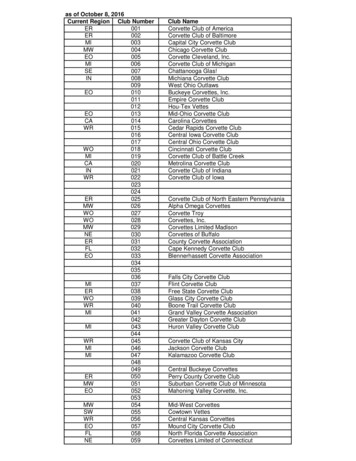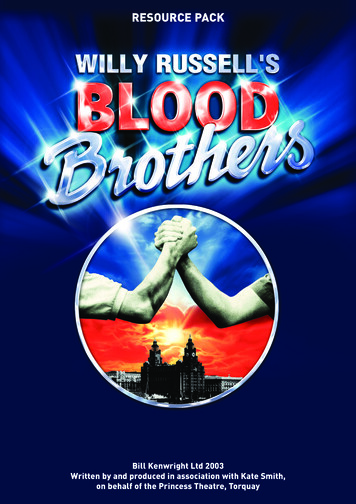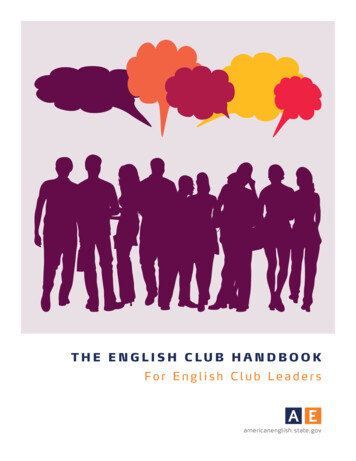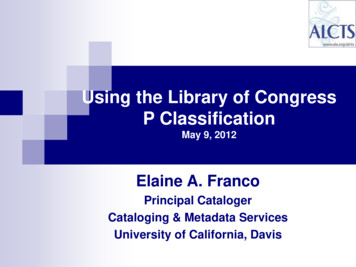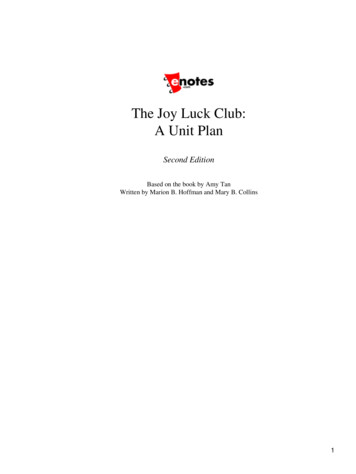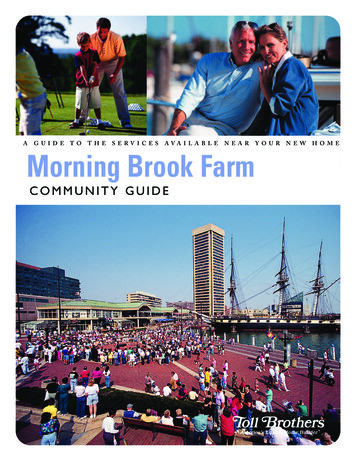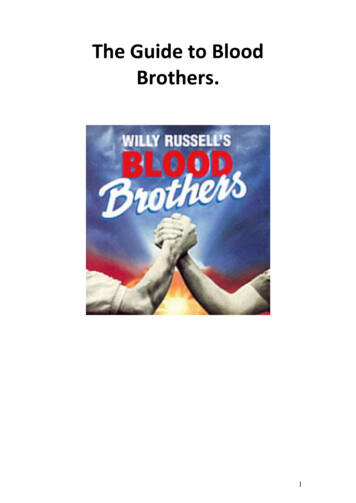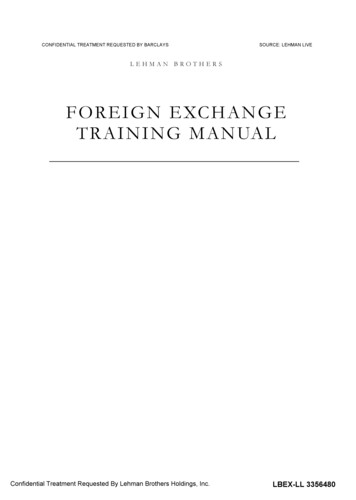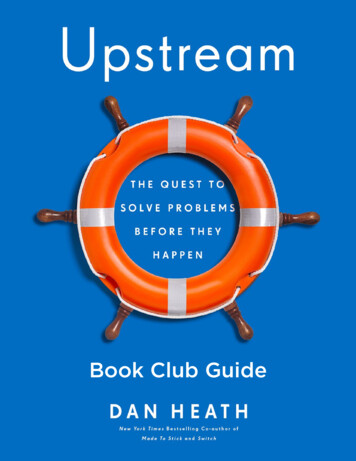
Transcription
Book Club Guide 2017 by Chip Heath and Dan Heath.Ask before distributing: brothers@heathbrothers.com
UpstreamBook Club GuideChapter 1: Going Upstream1. “So often in life, we get stuck in a cycle of response. We put out fires. We deal with emergencies. We handle one problem after another, but we never get around to fixing the systemsthat caused the problems.” Does this quote ring true for you? Talk about the situations whereyou feel like you’re stuck reacting to problems instead of fixing them.2. Heath discusses how a crime could have been prevented, from seconds before (a loudalarm) to decades before (by supporting pregnant women who are at risk). What was yourreaction to this spectrum? If you were a mayor with the power to spend large amounts ofmoney, where would you invest on the downstream-to-upstream spectrum?3. The U.S. health care system is more downstream than other countries, Heath argues. Doesyour experience with the health care system mirror this point or contradict it? Can you thinkof situations (perhaps with your family members) where an upstream investment might haveprevented a downstream health problem?4. “I don’t have to be at the mercy of these forces—I can control them. I can shape my world.And in that declaration are the seeds of both heroism and hubris.” Smallpox was cited as aheroic example; some military interventions (e.g., the U.S. interventions into Iraq and Libya)might qualify as negative examples. What other examples come to mind that show off eitherthe promise—or the perils—of upstream interventions?Upstream Book Club Guide Dan Heath2
5. One theme in the book is society’s neglect of the “invisible hero.” The people who preventproblems aren’t recognized in the same way as people who save the day. A lifeguard whorescues a drowning swimmer is an instant hero, while a swim coach who taught 100 four-yearolds how to swim—and thus helped to prevent accidents—is just someone who was doing herjob. Who were the invisible heroes in your life? Looking back, were there people whose influence helped prevent problems in your life?Chapter 2-4: The Three Barriers To Upstream Thinking1. The Chicago Public Schools story captures many of the book’s themes. Talk about whatstood out to you about the district’s work to reduce the dropout rate.2. Problem blindness is the belief that negative outcomes are natural or inevitable. ThePatriots had problem blindness about hamstring injuries: It’s a dangerous game; of courseplayers will get hurt. The CPS leaders had problem blindness about dropouts: It’s regrettable,but there’s nothing we can do about it. Do you think your organization suffers from problemblindness? If so, in what areas?3. “Every system is perfectly designed to get the results it gets,” said Paul Batalden. Doesthat idea resonate with you? What examples do you see in your organization or in society?4. In the 1960s and 1970s, the workplace’s blindness to sexual harassment was so completethat Helen Gurley Brown (Cosmo editor) basically encouraged women to roll with it. It’s ashocking quote by modern standards. (The quote is on page 31 if you want to review it.)When people reflect on our society 50 years from now, what do you think they’ll be shockedby? In what areas do you think we’re suffering from problem blindness?5. “What’s odd about upstream work is that, despite the enormous stakes, it’s often optional.” (page 41) Why? Why do downstream activities seem mandatory while upstream interventions are often voluntary?6. In Chapter 3, Heath tells the stories of Ray Anderson at Interface, who vowed to createa zero-impact business, and Dr. Bob Sanders in Tennessee, who led efforts to make car seatsmandatory in the state. Both leaders voluntarily took ownership of a major problem. Have youever been part of a group that took ownership of a problem that you hadn’t created? How didthat sense of “owning” the problem change the way you approached it?Upstream Book Club Guide Dan Heath3
7. Jeannie Forrest resolved her staffers’ dispute by asking them to “tell the story of thissituation as though you’re the only one in the world responsible for where we are.” How didthat idea strike you? Did any situations come to mind that might benefit from that kind offind-your-accountability approach?8. At the beginning of Chapter 4, Heath shares small personal upstream victories: his ownsecond power cord, the windowsill/glaucoma-drops strategy, and Rich Marisa’s timer switchfor the hallway light. Can you think of a recurring irritant in your life that you eliminated, forever, with the right upstream solution? Or one you’d love to eliminate going forward?9. The study of nurses’ behavior highlighted their tunneling behavior: They’re so accustomed to reacting to problems—and working around them—that they never get around tofixing them. Surely we can all relate to this. Why do you think tunneling is such a powerfultrap? Why isn’t it more natural to step out of the tunnel and engage in systems thinking?10. “There are only two areas of concern that seem to reliably trigger our upstream instincts:our kids and our teeth.” (page 64) Did you agree or disagree with that comment? Would yousuggest other areas to add to that short list?11. The three key barriers to upstream thinking, Heath writes, are problem blindness (I don’tsee the problem), lack of ownership (That problem is not mine to fix), and tunneling (I can’tdeal with that right now). Consider a problem that you’re concerned about, whether it’ssomething global such as climate change or something specific to your organization or family. In the context of that problem, which one of those three barriers has been the hardest toovercome?Chapters 5-11: Seven Key Questions For UpstreamLeaders1. Consider the remarkable effort in Iceland to reduce teenage alcohol and drug use. Do youthink a similar effort could work in the U.S.? Why or why not?2. Joe McCannon distinguishes “data for the purpose of inspection” from “data for the purpose of learning.” What are examples of each category that you’ve encountered in your life?What does it feel like when data is used for inspection?Upstream Book Club Guide Dan Heath4
3. Many of the upstream successes discussed in the book involve the use of a “by-name list”:the at-risk students in Chicago Public Schools, victims of domestic violence in Newburyport,and homeless people in Rockford. Why does such hyper-focus yield different results? What’sdifferent, exactly, between the abstract focus on “getting homeless people housed” and thespecific focus of “getting John Smith housed”?4. Heath compared health outcomes in the best neighborhoods to a roulette wheel whereyou can win by hitting either black or red. Meanwhile, in the worst neighborhoods, you canonly win with a green 0 or 00. What was your reaction to that analogy—fair or unfair? Do youbelieve that big discrepancies in life expectancies between nearby ZIP codes are primarily theproduct of flawed systems, as Heath argues, or of other factors, such as individual choices?5. David Foster Wallace’s parable of the fish asks us to consider, “What’s the water?” Inother words, what’s the nature of our environment, and its influence on us, and might thoseforces be invisible to us? What was “in the water” of your own upbringing?6. What are your feelings about an organization such as DonorsChoose—which is clearlywell-intentioned and helps a lot of people, but might also reinforce the bad systems thatspawned its work? Are there comparable questions you might ask about your own organization? Even as you pursue admirable goals with good intentions, might there be larger inequities or injustices that are unwittingly reinforced by your work?7. In the chapter on leverage points, Heath cites the example of an “age simulation suit,”that helps people feel what it’s like to be elderly. It’s an example of getting closer to a problem in order to identify leverage points. Can you think of situations where you consciouslypushed yourself closer to the source of a problem and, as a result, you uncovered some solutions that might have otherwise been hidden?8. Heath writes, “One of the most baffling and destructive ideas about preventive efforts isthat they must save us money.” Did you buy this argument? If so, why do you think this mindset is so widespread—the notion that preventive interventions must pay for themselves?9. What was your take on Gil Welch’s turtle/rabbit/bird analogy for cancer? Can you thinkof other situations in life where you encountered this same dynamic—that is, situations wherepeople took aggressive action to fight problems that might have been false positives?Upstream Book Club Guide Dan Heath5
10. Does your organization use data or technology to hunt for early warning signs of problems? Talk about the approaches you use. Have you been able to use those early-warningsignals successfully to avoid problems?11. In the story of Boston’s sidewalk repairs, the city had been tracking three perfectly reasonable metrics that turned out to be deeply flawed. Similarly, as a nation, we obsess aboutthe GDP as a measure of economic success. Yet that measure, too, is deeply flawed. By thestandards of the GDP, a divorce is “good” (since lawyers charge fees, which creates economic activity, while happy couples don’t ring the cash register); paying for child care is good,while providing it to your own kids is value-less; and extracting resources from the earth isgood while protecting them is not. What other example of this phenomenon can you think of,where the numbers being measured don’t reflect our true values?12. Heath shares the story of how he gamed his Dad’s offer to pay him 1 for every book ofthe Bible he read. What examples have you encountered in your life of people “gaming” measures? Have you ever indulged in such gaming yourself?13. What was your take on the Macquarie Island story? Was it a fiasco—or a success storythat simply took a long time to realize?14. Did you feel paralyzed by the complexity involved in systems thinking (as with theplastic bags example)? If so, did that paralysis make you feel less confident/excited aboutpursuing upstream work? If you didn’t feel paralyzed, talk about how you get comfortablewith complexity and unknowns. What allows you to stay optimistic in the face of so manyuncertainties?15. Were you familiar with the “wrong pocket problem” before reading the book? Whatdo you think should/could be done to create incentives for programs like the Nurse-FamilyPartnership to be funded? Did South Carolina’s three-year slog to create a “Pay for Success”program feel like a sound investment to you—or like bureaucratic madness?16. Is there any service that you buy—in the spirit of Heath’s pest control subscription service—that reflects an upstream investment? I.e., you’re spending money today to prevent ordelay a more expensive problem down the road?Upstream Book Club Guide Dan Heath6
Chapters 12-13: Far Upstream And You, Upstream1.What’s your take on Y2K, from what you know of the issue? Crisis avoided—or hoax?2. FEMA couldn’t come up with 15,000 in travel expenses for more disaster-preparednessexercises like Hurricane Pam. Subsequently, over 62 billion was approved for rebuilding theGulf Coast after Katrina. In some ways, these two facts are the perfect symbol of our preference for downstream action over upstream. How do you account for this enormous discrepancy? Why are we “penny-wise and pound foolish” in this way?3. What did you think of Nick Bostrom’s “urn” analogy? Do you think mankind is at risk ofextinction for the reasons he describes? If not, what gives you more faith? What do you thinkcould be done to lower the risks of the catastrophes Bostrom describes?4. In the last chapter, Heath quotes an old proverb: “The best time to plant a tree is 20 yearsago. The second-best time is now.” In what areas of your life do you wish you’d acted yearsago? And, in the spirit of the proverb, how might you take action today?5. Heath offers three suggestions to guide our efforts to contribute to societal problems: 1.“Be impatient for action but patient for outcomes.” 2. Macro starts with micro. 3. Favor scoreboards over pills. Which of these did you find most helpful or relevant for your own interests?What else have you learned about how to be effective in situations where progress may comeslowly?6. Robert Baden-Powell said, “Try and leave this world a little better than you found it.” Whois an upstream hero of yours—someone who clearly accomplished that? It might be someoneon the global stage—a leader or activist. Or it might be someone you’ve encountered personally: a mentor, a relative, a teacher. What did you learn from that person’s example?Upstream Book Club Guide Dan Heath7
Upstream Book Club Guide Dan Heath 3 5. One theme in the book is society’s neglect of the “invisible hero.” The people who prevent problems aren’t recognized in the same way as people who save the day. A lifeguard who rescues a drowning swimmer is an i
